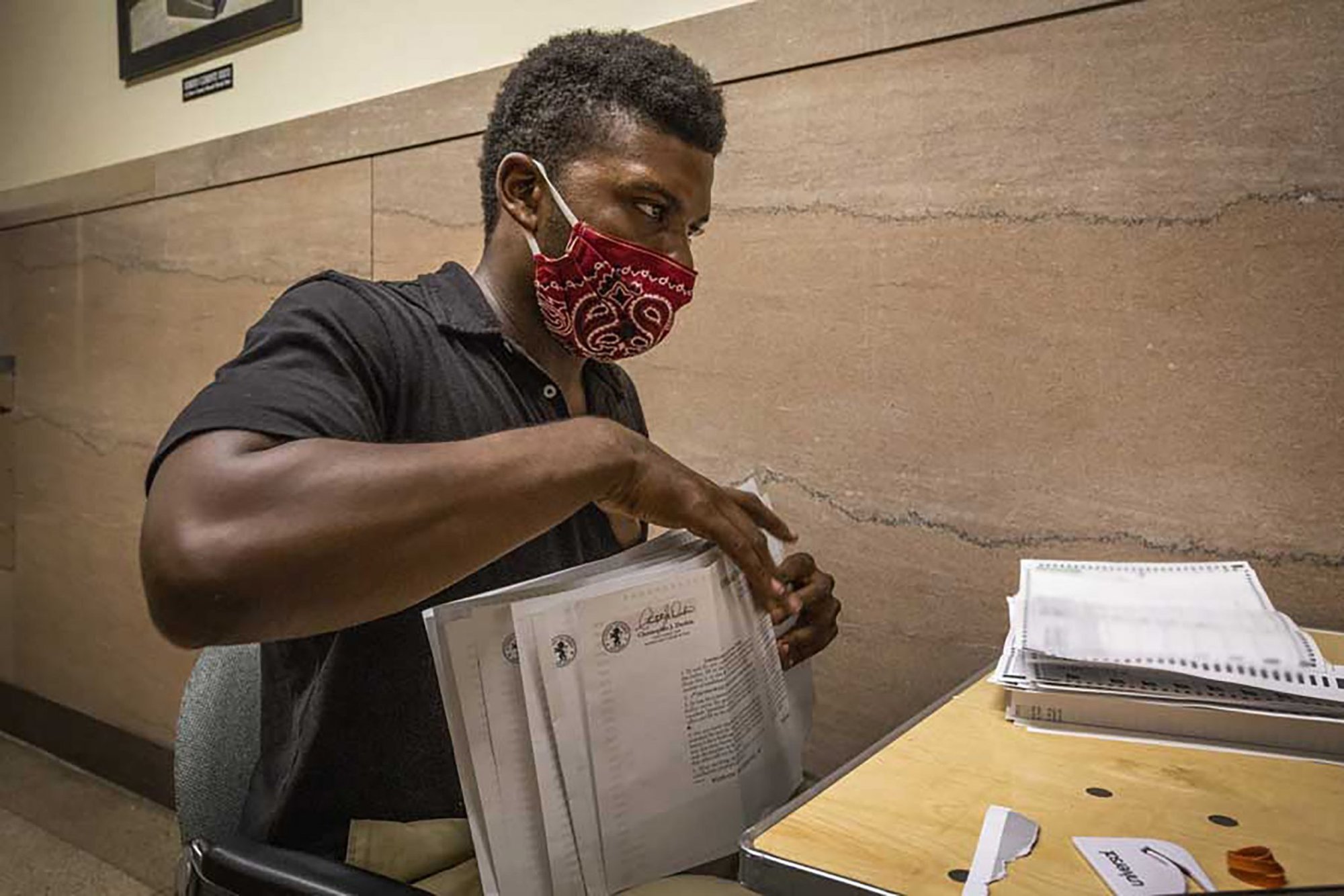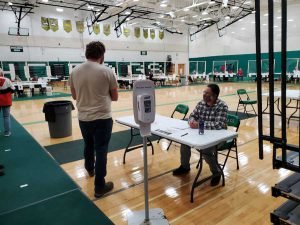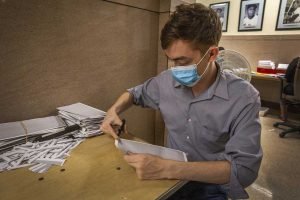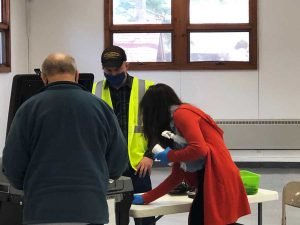Camouflaged as Polling Workers, National Guard Presence During Primaries Fuels Worries of Militarized Presidential Election

U.S. Army Spc. Isaiah A. Lee, Headquarters and Headquarters Company, 2nd Battalion, 113th Infantry Regiment, New Jersey Army National Guard, files a batch of ballots at the Essex County Board of Elections in Newark, New Jersey, July 22. More than 120 New Jersey Army National Guard soldiers, under the supervision of election officials in seven counties, performed duties at polling stations and other county government offices related to the state’s primary election. This is the first time the New Jersey National Guard has supported a domestic election. (This photo has been altered by blurring out personal information on the ballots.) Photo by Mark C. Olsen, courtesy of New Jersey National Guard.
By COURTNEY MABEUS
By the time Wisconsin Governor Tony Evers’ statewide “safer at home” order took effect March 25, Milwaukee election workers had already called out from work in droves.
The streets outside City Hall looked like those of a ghost town. But even as most city employees worked from home, a fraught scene unfolded inside the election commission’s fifth-floor office: About 100 rattled workers scrambled to plan for an April 7 primary even as state lawmakers turned the event into a legal battle.
“We were forced by the politics of this state to go forward and have in-person voting on election day,” Neil Albrecht, the now-retired executive director for the city’s election commission, told The War Horse in a phone interview.
As the novel coronavirus began its rapid spread across the United States, Wisconsin became the first state to hold an in-person election. Milwaukee, the state’s largest city, typically requires as many as 2,000 poll workers to carry out a large-scale election, like a presidential primary, Albrecht said. With only about a week to go, the number of workers who said they’d be willing to show up dropped to about 350.
“We were drowning,” Albrecht said.
“Our goal was to make sure that you couldn’t tell whether it was a Guardsman or a volunteer,” said Kentucky National Guard spokesperson Maj. Stephen Martin.
Election officials are already sounding alarms that they may face a shortage of poll workers—who tend to be retirees and at higher risk for complications from COVID-19—come Nov. 3. Add to that fears of voter suppression as the president has urged tens of thousands of supporters to act as “poll watchers,” as well as concerns that protests or political demonstrations might interrupt voting, and Wisconsin’s move to activate its National Guard may predict a trend for a national election for a country in the grip of a pandemic.
Trump called on his followers to “go into the polls and watch very carefully” during the first presidential debate, stoking concerns that polling stations may descend into chaos on election day. States have strict rules about how the poll-watching process works, and many prohibit just showing up on election day.
“All governors, especially those in battleground states, need to [be] ready and call out National Guard to protect polling places and would-be voters in light of [Trump’s] call on his supporters to ‘go into the poll and watch very carefully,’” Richard Haass, president of the Council on Foreign Relations, tweeted after the debate.
In Nebraska, one county poll could not have opened for its May primary without the National Guard’s help. They wouldn’t have had enough poll workers, Adjutant General Maj. Gen. Daryl Bohac said in an interview with The War Horse.

“It ties directly to the oath of office that we all take, which is to support and defend the Constitution of the United States and the Constitution of Nebraska for us here in Nebraska,” Bohac said. “So that oath of office to defend democracy and democratic ideals was probably played out most explicitly when we do election support, which to my knowledge, we’ve never done before.”
Bohac’s sentiment is shared by other state National Guard and state and local elections officials, who said the military fulfilled a critical need during a crucial time. They emphasized the Guard members’ role as citizen-soldiers who served only as support for desperate elections officials. In all but Kentucky–where soldiers and airmen performed only administrative and logistical support like directing traffic and sanitizing—Guard members received the same training as civilians. In each of the four states where the Guard provided on-the-ground elections support, members showed up for duty in civilian clothing.
“Our goal was to make sure that you couldn’t tell whether it was a Guardsman or a volunteer,” said Kentucky National Guard spokesperson Maj. Stephen Martin.
Bohac echoed Martin’s comment. He directed the Guard not to wear uniforms out of concern for the spirit of federal laws, he said, which already bar intimidation and military and law enforcement interference at the polls.
“There shouldn’t be concerns by anybody, as they walk into a poll site, by uniformed presence,” he said.
While elections and other experts who spoke with The War Horse acknowledged the role the National Guard played in the earlier months of the pandemic, they worry that well-intentioned efforts to help in the future could be undermined by an increasingly volatile political atmosphere.
The mere presence of any military at the polls could intimidate some voters, particularly in communities of color, and should be done only as a matter of last resort, with care and transparency, they said.
“Any sort of inference that the military has a role in which basic decisions about who votes and how votes are counted could be influenced by the military is danger zone, danger zone, danger zone,” said John Lindback, a former international elections observer who has served as the past executive director for the Electronic Registration Information Center as well as the director of elections for Oregon.
The United States divides civilian control of the military between Congress and the president to ensure no individual or group—including the military—ever gains enough power to take over the government. This is also why service members are not allowed to support a candidate while in uniform, and why general officers seldom publicly endorse a candidate until after they leave the service.
“The problem with calling in the National Guard is No. 1, you know, the military should have no role in elections,” Lindback said. “Two, you have to train them like you have to train any other kinds of poll workers. So why not go out and find younger poll workers who are willing to do this and make it a national appeal based on patriotism?”
As Wisconsin faced its statewide shortage of poll workers, the Wisconsin Elections Commission worked behind the scenes, asking whether the state’s National Guard could help. With five days to go, the commission got word that it had received the stopgap it needed to open in-person voting. On April 6, more than 2,400 Guard members, dressed in civilian clothes, were ready to report to election officials in all but one of Wisconsin’s 72 counties.
“The Wisconsin primary could not have functioned if they didn’t have the National Guard support,” said Nathaniel Persily, a professor at Stanford Law School.
Not only would the deployment become the Wisconsin Guard’s largest-ever state activation, but officials also believe the April 7 primary is the first time an official state militia has ever been called to assist at the polls. In the weeks and months that followed, Wisconsin became a model for other states, including Nebraska, New Jersey, and Kentucky.
“We felt that we were keeping our communities safer and healthier, while also ensuring they still are protecting their right to vote in the primaries,” said New Jersey Army National Guard 1st Lt. Nicole Callahan.
Callahan was one of about 140 members who volunteered to work after Gov. Phil Murphy moved his state’s June 2 primary to July 7, switching it almost exclusively to vote-by-mail. Callahan spent a day in Trenton alphabetizing and scanning ballots, and checking signatures against a database.
Experts said states, particularly battlegrounds like Wisconsin, need to think even more critically about involving their National Guards in upcoming elections given recent actions by the Trump administration to quash protests, as well as the politicization of the pandemic.
“I think in part, the protests have reminded people that the National Guard can be a flashpoint in cities,” Lindback said.
Those actions are complicated even more by comments about widespread voter fraud and other misinformation shared by the president questioning the legitimacy of mail-in voting—intended as an alternative to those reluctant to vote in person during the pandemic. In a late July tweet, Trump floated the idea of delaying the election. Additionally, in late August, Trump said law enforcement and U.S. attorneys would be part of a group that would monitor voting.
“Since the protests and since the rolling out of troops in cities across the United States, we have to be particularly careful now about deploying the National Guard in any place where voting is happening, just because of the symbolism of it all,” Persily said.
On principle, “it’s ridiculous” that the National Guard would be relied on at all to fill in, Persily said.
“Most countries invest enough in their democracy so that you can have a professionalized civil service that can fill these roles,” he said. “We rely on volunteers.”

Changing the calculus
Despite being deployed across all 50 states, three territories, and in Washington, D.C., as part of the response to COVID-19, nowhere has the National Guard been more visible in recent months than in the nation’s capital, where Black Lives Matter demonstrators clashed with law enforcement and other officials in early June.
Before Trump—alongside military brass—strode across the White House lawn to Lafayette Square for a controversial photo opportunity outside St. John’s Episcopal Church, federal law enforcement allegedly used smoke, flash grenades, and tear gas to clear demonstrators with little warning. As that was happening, Trump, referring to himself as “your president of law and order” during a speech from the Rose Garden, threatened to unleash civilian and military forces to end the demonstrations.
The National Guard has maintained that it had no involvement in the violent June 1 law enforcement response against demonstrators. D.C. National Guard Maj. Adam DeMarco, the senior officer on scene, has challenged the Trump administration’s account of the event.
The Lafayette Square incident and additional protests across Washington coincided with the city’s June 2 primary, a concern for Marcia Johnson-Blanco, who co-directs the Lawyers’ Committee for Civil Rights Under Law’s Voting Rights project. A 7 p.m. citywide curfew conflicted with the polls’ 8 p.m. close, she said.
“Because it happened in real time, it was hard to know what guidance to give people about should they be out after curfew voting and what the repercussions are likely to be,” Johnson-Blanco said.
As a result, Johnson-Blanco said any National Guard involvement in elections should be carefully considered, with a focus on meeting the needs of poll workers and supporting voters but without a highly visible presence.
Kentucky’s June 23 primary followed the June 1 fatal shooting of David McAtee, a 53-year-old Black barbecue restaurant owner, by a state National Guard member responding to protests in Louisville. The state Guard had been called in during protests over the fatal shooting of Breonna Taylor, a 26-year-old Black woman killed by city police in her home.
About 240 Kentucky National Guard members supported its June 23 primary with the bulk, about 50, in Jefferson County, home to Louisville. Martin, the Kentucky Guard’s spokesperson, said he spotted some comments on social media that questioned whether the Guard’s support during the primary was appropriate but added they did not gain traction.
“The use of [the] National Guard now, more recently to suppress protests—legitimate protests—in the wake of the killing of George Floyd, I think all of this maybe changes the calculus when it comes to the question of whether the mere presence of state National Guard in state active-duty status at a polling place would be intimidating,” said Elizabeth Goitein, co-director of the liberty and national security program at the Brennan Center for Justice.
The idea that citizen-soldiers and weekend warriors make up the National Guard has shifted, Goitein said. Frequent overseas deployments following the terror attacks of Sept. 11, 2001, have made the Guard increasingly indistinguishable from active-duty troops.
“There’s 30,000 National Guard right now deployed around the world as part of our endless war against everyone,” Goitein said.
Eleven governors sent National Guard members to Washington at the president’s request to help subdue protests there. That support was extended under what’s known as “Title 32,” an operational status authorized at the federal level but under the command and control of a state governor. It’s a status often used for disaster response. The Trump administration upped the ante again when it sent federal law enforcement to Portland to quash protests in that city over the objections of state and local officials.
“It’s actually a thing that he and his leadership wants to perpetuate because they know the chilling effects of that type of suppression,” Jamal Watkins, vice president of civic engagement at the NAACP, said of the Trump administration’s efforts to maintain a law and order narrative. “It keeps people afraid, scared, or not wanting to be bothered or even caught up in something because we all want to feel safe in this country. And nine times out of 10, depending on what you look like, your relationship to law enforcement is not always a positive one on the surface.”
While a Defense Department regulation prohibits the Guard from conducting operations at polling stations while under Title 32, its operational status is likely of little consequence to the general public, who may not even be aware of the differences between state and federal duty status, Goitein added.
The actions of one Wisconsin National Guard member, even out of uniform, bothered Melody McCurtis, as originally reported by the Milwaukee Journal-Sentinel.

She knew in advance that the Guard would be supporting Milwaukee’s April 7 primary. As an organizer in a predominantly Black part of the city, she said she is used to her community being “militarized.” After a full day spent urging others to vote, McCurtis joined a long line outside Washington High School to cast her ballot. She was already frustrated; a mail-in ballot McCurtis requested in March had not arrived.
As she waited in line, McCurtis encountered a man who she said she later learned was a Guard member walking its length and warning of a few hours’ wait. One woman “stormed off,” McCurtis told The War Horse in a phone interview.
She said she told the man, who was not wearing a mask, that he needed to stop because he was “encouraging folks to just leave and give up.”
“We’re already overly militarized, and from what I experienced, that was just another way to disenfranchise voters,” McCurtis said. She is a plaintiff in a federal lawsuit alleging that the April 7 election was a “mass disenfranchisement.”
Capt. Joe Trovato, a spokesperson for Wisconsin’s Guard, told The War Horse there had been no complaints about the incident and he was unaware of it.
In late August, after protests following the shooting of an unarmed Black man by police in Kenosha, about 35 miles south of Milwaukee, Evers announced he was activating the National Guard to support law enforcement. That deployment came just days after a contingent of National Guard soldiers returned from a 13-month deployment to Afghanistan. The Guard was again called upon earlier this month to support law enforcement bracing for protests in Wauwatosa, a city immediately west of Milwaukee, after local officials announced they would not charge a police officer accused of fatally shooting a Black teenager in February.
The state’s National Guard has also assisted in smaller numbers with two more elections, including in May and August.
Reid Magney, a spokesperson for the Wisconsin Election Commission, said local clerks are working to recruit poll workers. He called it a “fluid situation” with frequent changes, but added the commission is in contact with the state National Guard not only on personnel needs but also for sanitary supplies and other protective equipment that come through the State Emergency Operations Center.
“I would say we don’t know right now whether or not there’s an emergency,” Magney told The War Horse in mid-September. “I think we can certainly foresee a potential role for the Guard in November.”
Editors Note: This article first appeared on The War Horse, an award-winning nonprofit news organization educating the public on military service. Subscribe to their newsletter.

The War Horse is an award-winning nonprofit newsroom and the most trusted source for bulletproof reporting on the human impact of military service. Our team holds power to account, strengthens our democracy, and improves understanding of the true cost of military service.
BRCC and Bad Moon Print Press team up for an exclusive, limited-edition T-shirt design!
BRCC partners with Team Room Design for an exclusive T-shirt release!
Thirty Seconds Out has partnered with BRCC for an exclusive shirt design invoking the God of Winter.
Lucas O'Hara of Grizzly Forge has teamed up with BRCC for a badass, exclusive Shirt Club T-shirt design featuring his most popular knife and tiomahawk.
Coffee or Die sits down with one of the graphic designers behind Black Rifle Coffee's signature look and vibe.
Biden will award the Medal of Honor to a Vietnam War Army helicopter pilot who risked his life to save a reconnaissance team from almost certain death.
Ever wonder how much Jack Mandaville would f*ck sh*t up if he went back in time? The American Revolution didn't even see him coming.
A nearly 200-year-old West Point time capsule that at first appeared to yield little more than dust contains hidden treasure, the US Military Academy said.












